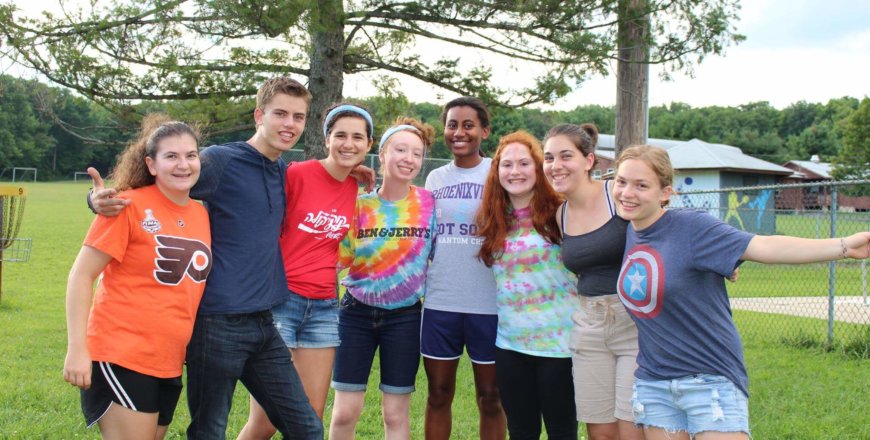
Creating an Engaged Future: Findings from the URJ Youth Alumni Impact Study
By Miriam T. Chilton and Alex Pomson
In Fall 2017, the URJ engaged Rosov Consulting to measure the lifelong impact of URJ youth programs. There have been many such alumni studies in the Jewish community in recent years focused on questions of Jewish continuity, identity building, and other traditional markers of success. In this study, we set out to ascertain if the URJ’s youth programs are achieving the goals of the URJ: to strengthen communities that transform the way people connect to Jewish life and build a more whole, just, and compassionate world. By measuring against these organizational objectives, which often went beyond the traditional measures such as whether our alumni are married to other Jews or lighting Shabbat candles each week, we were able to measure how Reform youth experiences such as URJ camps, NFTY, and congregations help alumni flourish as Reform Jewish adults while inspiring them to positively impact the world.
Against a backdrop of the changing composition of Jewish and American family life and the increasingly competitive race for college, the URJ enjoys some of the highest camper retention rates among the network of Jewish summer camps, and current NFTY participants eagerly share their positive experiences in post-event surveys. While these are important markers of current success on participants, we also want to understand the impact beyond those experiences. This study is one of several investments the URJ is making to measure and evaluate the success of our work in fostering a more whole, just, and compassionate world.
In surveying alumni, we set out to measure:
- Does participation in these programs as children inspire alumni to find joy and meaning in Jewish life as adults?
- In what ways do Reform youth experiences influence the choices alumni make for themselves and their children?
- In what ways does participation in Reform youth experiences lead to a flourishing Jewish community?
This survey of more than 3,000 alumni (aged 25+) from among more than 375,000 alumni of URJ youth programs was compared to the Pew Center’s 2013 Portrait of Jewish Americans. The study found that the URJ’s youth programs create quality, lifelong Jewish outcomes, the benefits of which are “paid forward” at least one generation.
The research points to a continuum of influence that starts during a person’s childhood and youth, continues through their college years, and sees expression in Jewish engagement and identification during adulthood, even many years later.
Across different types of experiences, the Reform Movement delivers youth programs that have long-lasting impact. Among the key findings:
- Alumni care about being Jewish and feel that Jewish community is essential (81%). Alumni say “Being Jewish is very important in my life” at more than 2x the rate of those Reform identifying Jews in the 2013 Pew Study of Jewish Americans (81% vs. 37% in Pew). Beyond the great importance of identifying as Jewish, alumni care deeply about identifying as Reform Jews.
- Alumni care about finding meaning in Jewish rituals. Alumni care deeply about living Jewish life with meaning and intent. In fact, about two-thirds (65%) of alumni say that “choosing and adapting Jewish rituals that are meaningful to me” is an essential part of what being Jewish means to them. Nine in ten alumni (91%) agree or strongly agree that “participating in Jewish activities makes me feel good about myself.” These findings bring into focus a signature outcome of Reform youth experiences – choosing, adapting, and practicing meaningful Jewish rituals.
- Alumni care about doing good. Alumni agree (87%) that “doing volunteer work is important to me.” They also say that Jewish concepts of Tikkun Olam inspire them to make the world a better place. Alumni credit Reform youth experiences with deeply influencing their views and actions on today’s most pressing social justice issues, including Anti-Semitism, gun violence prevention, LGBTQ equality, and more.
- Alumni provide Jewish education to their children (98%). Jewish education is all but universal among the children of alumni, with the great majority (89%) reporting that they choose Reform Jewish education for their children.
- Reform Movement teen experiences translate into greater Jewish participation in college, which in turn is a catalyst for greater Jewish engagement later in life. When controlling for their Jewish background, we found that Reform Movement teen experiences are associated with high levels of Jewish participation during young adulthood, including participation in Hillel or other Jewish programs on campus; studying Jewish content; volunteering for Jewish causes; and working for URJ camps or as NFTY counselors in college. Participation in multiple teen experiences seems to have a compound effect on college-age engagement.
- Alumni exhibit similar social and behavioral outcomes to alumni of other Jewish movements. Over the past decades, several studies have been conducted which look at the long-term effects of Jewish youth movements and summer camps on their alumni. While these studies vary somewhat in their methodological approach, they offer several points for comparison to our study. Overall, alumni of Reform Movement teen experiences share similar levels of Jewish engagement outcomes with alumni of other movements, in categories including Jewish identity, Jewish friendships, and synagogue membership.
The data vividly demonstrate that having had Reform Jewish experiences as a teen – be it in the context of NFTY, URJ Camps, or other congregational teen experiences – is strongly associated with an array of Jewish outcomes later in life, the effects of which are boosted by Jewish engagement during college-age years.
As the Jewish community faces challenges to retain active participants, URJ Youth programs prove to be an antidote, offering a future of engaged adults and active global citizens, looking to pass along their Jewish values and education to their children.
Read more about the methodology of the study and the detailed findings at www.URJYouth.org/Impact.
Miriam T. Chilton is Vice President, Youth, Union for Reform Judaism. Alex Pomson is Managing Director, Rosov Consulting.




